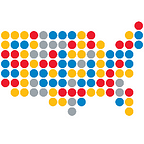Starting Over with Regulation
Why are government rules so complex? A guide to a radically simpler system
Earlier this year, the Colorado Department of Human Services proposed new rules for day-care centers. Government oversight of day care seems like a good idea — you wouldn’t want children cooped up in an airless basement — but this proposal went far beyond basic health and safety.
The new rules would dictate exactly how to do just about everything: how many block sets (“at least two (2) … with a minimum of ten (10) blocks per set”), where the children can play with the blocks (on “a flat building surface” that is “not in the main traffic area”) and when caregivers must wash their hands (before “eating food,” “after wiping a child’s nose,” etc.).
This is the way regulation works in America: Regulators try to imagine every possible mistake and then dictate a solution. The complexity is astounding.
Under a recent federal directive, the number of health-care reimbursement categories will soon increase from 18,000 to 140,000, including 21 separate categories for “spacecraft accidents” and 12 for bee stings. There are over 140 million words of binding federal statutes and regulations, and states and municipalities add several billion more.
Regulation is deliberately designed to avoid human discretion — to create a regulatory code that is self-executing. By making rules as precise as possible, we hope to avoid bad judgment. The unfortunate side effect has been to preclude good judgment. Modern regulation doesn’t just control undesirable practices — it indiscriminately controls all the work of regulated entities.
Taking responsibility is basically illegal in the modern regulatory state. A teacher can’t maintain order in the classroom without filling out forms and facing a potential legal hearing. Judges sit on their hands, letting people sue for almost anything. An inspector feels that he has no choice but to shut down an unauthorized neighborhood lemonade stand — a rule is a rule.
America needs a radical regulatory overhaul, but wholesale deregulation is not the answer. Most of us still want the government to set standards for things like clean air and work safety. In place of today’s regulatory micromanagement, what we need is results-based regulation, with simpler rules tied to the outcomes they produce.
What would such a regulatory system look like? In the first place, it would be radically simpler. Most bureaucratic detail could be scrapped, and law would become understandable again. The focus would shift from complicated rules to desired results: clean air, safe food, honest business.
The federal worker-safety laws now include some 4,000 rules dictating precisely what equipment can be used and how facilities are built. Some are embarrassingly self-evident, like the rule that stairwells shall be lit by “natural or artificial illumination.”
Most of the detail could be subsumed within a general principle: “Facilities and equipment shall be reasonably suited for the use intended, in accord with industry standards.” When a specific protocol is essential — as in situations where a tiny mistake can lead to disaster — it will no longer be lost in a sea of detail.
In Britain, financial institutions have to answer to such principles as “A firm must conduct its business with integrity” and “treat [customers] fairly.” Applying those principles to Wall Street would provide ample authority for regulators to stop the next bubble without smothering credit transactions under thousands of pages of new rules.
The standard objection to such a simplified system is that people would take advantage of the leeway: Companies would ignore their obligations, and bureaucrats would abuse their powers. The only answer to these fears is accountability. There’s no need to trust business: Give inspectors presumptive authority to decide whether or not a business is meeting its regulatory obligations. Nor do we need to trust officials. The system would need to include ways to overrule regulators who are unreasonable and to fire them if they consistently show bad judgment.
Another key feature, after simplicity and accountability, would be mandatory sunset provisions for all regulations, since old regulations tend to take on a life of their own. Even good programs can spin out of control.
Consider our federal special-education laws, passed in the mid-1970s to end the shameful neglect of the small percentage of students with special needs. Special ed has now grown to consume 20% of the total K-12 budget in the U.S. Programs for gifted children, by contrast, get less than half of 1%.
Is this the correct balance? No one is even asking the question, because the regulations dictate the outcome. If regulations periodically expired, Congress would have to make new findings to ensure that the program aligns with current educational priorities.
Finally, small entities should be regulated differently. Small businesses pose a special challenge. Society has a legitimate interest in, say, keeping welding shops from giving off noxious fumes, but the technical details of compliance are often beyond the capabilities of the average owner.
One new approach might be to allow independent oversight: Just as most businesses have a CPA who blesses their books, they could have a “certified regulatory expert” to monitor their compliance. Government would oversee CREs but not businesses themselves.
No one would design the regulatory system that we have now. No area of it, from environment to education, works as it should. It is unimaginably wasteful, diverting and discouraging legitimate activity of every kind.
Government oversight is essential to freedom and fairness in the modern world. But as Tocqueville observed, there is a key difference between “centralized government,” which performs that role while respecting individual discretion, and “centralized administration,” which drives people crazy by telling them how to do everything.
The villain today is not government but pointless bureaucracy that is beyond human control.
This originally appeared in the Wall Street Journal on December 3, 2011
